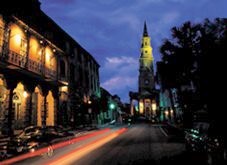|
Will Keep HQ Rooted in Charleston
SUMMERVILLE, S.C. – Ending a U.S. Southeast search that had shaved its short list down to three states, forestry biotech startup ArborGen has decided to remain rooted in the Charleston, S.C., metro. The city of Summerville, S.C. edged out final-list competitors Research Triangle Park, N.C., and Athens, Ga.
With the headquarters announcement, the startup - which forest-industry powerhouses MeadWestvaco Corp. and International Paper Co. own some 60 percent of - will almost triple its staff in Summerville.
Created in 2000, ArborGen selected the Charleston metro because of "a combination of strengths," said Barbara Wells, who was tapped as the company's new chief executive officer in August.
The area's "strong, forestry-based community," she said, "has an understanding of the need for this type of technology." Other major factors in Charleston's favor, Wells added, were "a knowledgeable, available work force and a state-of-the art facility available for lease."
International Paper Researchers
"An innovative new company like ArborGen is a tremendous addition to our biotech community and adds to our growing reputation in this sector," said F. Eugene Williams, chairman of the Charleston Regional Development Alliance, which made a strong pitch for the project. "We have a strong employee base that will help the company meet its expansion and research goals today and into the future. It's a win-win situation for everyone."
ArborGen now plans to add some 34 new employees - most of them high-end research positions - in Summerville. Most of the new hires will be researchers who've previously worked for MeadWestvaco and International Paper, ArborGen officials said. The company expects to further expand its South Carolina work force by 5 to 10 percent over the next year, they added.
"Our new headquarters will offer the resources that allow us to create technologies that improve productivity in plantation forests and reduce the need to harvest from important natural forests," said ArborGen Chief Technology Officer Maud Hinchee.
ArborGen's current research includes developing faster-growing trees to improve tree plantations' productivity; producing trees that are straighter, more disease-resistant and higher in structural wood properties; and discovering genes that contribute such important tree traits as wood quality and yield.
One of ArborGen's current gene-manipulation projects, Hinchee explained, centers on controlling production of lignin, a naturally occurring substance that makes trees rigid. Increasing or decreasing lignin production could make trees more suitable for specific forestry uses.
Reducing lignin, for example, would allow U.S. papermakers to use fewer chemicals in producing pulp. That lignin reduction's net bottom-line impact would be a savings of between US$1 billion to $3 billion a year for the U.S. pulp-making industry, according to studies by Houghton, Mich.-based Michigan Technological University.
|
"The company's leadership position puts us in an excellent position to be the provider of choice for these products," Wells said.
As State's No. 3 Manufacturing Sector
ArborGen's future, though, is definitely in the long view. The company is eight to 10 years away from launching its first commercial products, ArborGen officials say.
The startup, however, is well funded. ArborGen got a $60-million, five-year commitment from its joint-venture partners in 2000. Rubicon Industries USA, part of a New Zealand-based biotech company, holds an ownership share equal to the startup shares individually owned by MeadWestvaco and International Paper. Another 5 percent of the venture is owned by Genesis Research and Development, a New Zealand-based genetic research company.
|
Virginia Beach; City Hoping for More
by JACK LYNE, Site Selection Executive Editor of Interactive Publishing
VIRGINIA BEACH, Va. – Cendant Corp., the world's No. 1 hotel franchisor, is checking 100 new jobs into Virginia Beach, Va. – the same city the New York-based giant checked 100 employees out of in a 2002 relocation.
Virginia Beach beat out an undisclosed location in New Jersey, Cendant officials said. The Virginia call center will be a human resources call center that will be available for use by all of Cendant's 80,000 worldwide employees.
"We selected Virginia Beach as the location for our new employee contact center because of its reputation for high-quality employees with a superior work ethic," said Cendant Executive Vice President of Human Resources Terry Conley. "We are pleased to be able to expand our business to the commonwealth of Virginia and the city of Virginia Beach."
|
Cendant's Broad Business Range
The company, whose hotel and motel brands include AmeriHost, Days Inn, Howard Johnson, Ramada and Super 8, also owns Avis Group Holdings and Fairfield Resorts. Cendant has expanded its travel services by acquiring Cheaptickets.com and Galileo International. In addition, the company's reach also includes its Cendant Real Estate Franchise Group (which includes Century 21 and Coldwell Banker), as well as tax-preparation franchisor Jackson Hewitt, which provides mortgage and corporate-relocation services as well.
The Virginia Beach space that the call center will move into, in fact, was formerly occupied by a 100-employee Jackson Hewitt technology center. Cendant closed the center in the summer of 2002, relocating Jackson Hewitt's tech operation to Sarasota, Fla.
The building selected for Cendant's 100-employee call center also connects with the company's multi-tentacled organizational network.
The facility is still known locally as "the Avis Building," a moniker reflecting its history. Avis built the 160,000-sq.-ft. (14,400-sq.-m.) facility for a reservations center, which opened in Virginia Beach in 1996.
After acquiring Avis in March of 2001, however, Cendant decided to close the rental-car company's Virginia Beach reservations center, part of an initiative to streamline the customer-contact functions for its rapidly broadening range of acquisitions. That initiative included signing a 10-year, $1.4-billion outsourcing deal in late 2001 with IBM Global Services, which included consolidating some customer-contact operations, offloading some help-desk services and managing Cendant's data operations.
The Virginia Beach call center will partially restock Cendant's work force in the city, which peaked at almost 1,000 in 1999. The only Cendant-related tenant now residing in the Avis Building is a 275-employee Avis national processing center. The building's other large tenant is a 250-employee call center for Trilegiant Corp., a membership-based provider of travel, shopping, health, dental, entertainment and consumer-protection services, which Cendant offloaded last year.
Gives Company Speed, City Hope
The Avis Building's vacant space was also a major impetus in officials' eagerness to bring in parts of Cendant's organization. City officials say that they're currently working with the company to bring more of its broad range of business operations into the building, which Cendant has owned since the Avis acquisition.
"When a long-time corporate citizen decides to increase its presence in your community, it's good news," said Virginia Beach Mayor Meyera Oberndorf. "When you learn that corporate citizen is an economic titan such as Cendant, it's cause for a celebration."
No. 217 on the Fortune 500, Cendant is receiving both state and city incentives for the call center project. The Virginia Beach Development Authority is providing a $70,000 grant for work-force training for Cendant. The grant is coming from the city's economic development incentive program, which is funded by a cigarette sales tax.
The Virginia Department of Business Assistance is also providing some $200,000 in incentives, which will also be used for work-force training.
|
CNH Global Unit Yo-Yos Back
to Wisconsin from Illinois
by JACK LYNE, Site Selection Executive Editor of Interactive Publishing
RACINE, Wis. – Illinois and Wisconsin have just finished their own little informal tractor pull for the North American headquarters of CNH Global's farm and construction equipment business. The world's largest manufacturer of agricultural tractors and combines and the third-largest maker of construction equipment, CNH Global pulled that headquarters out of Racine, Wis., three years ago. The company relocated the function in the Chicago suburb of Lake Forest. Now, though, the North American farm and construction equipment business headquarters is relocating again - back to Racine.
It hasn't been inter-state recruiting wars, however, that have driven that yo-yo modus operandi. Instead, merger-related matters have supplied the shifting momentum.
The ping-pong location pattern traces back to 1999, when Racine-based Case IH was acquired by UK-based New Holland NV. That acquisition touched off a number of relocations.
After first changing its name to CNH Global, New Holland NV relocated its worldwide headquarters from the UK to Lake Forest. In addition, CNH Global relocated its North American farm and construction equipment business arm's headquarters to Lake Forest. The relocation from Racine was part of a company-wide initiative to facilitate the fusion of the two giants, CNH Global President and Chief Executive Officer Paolo Monferino explained.
"The centralized approach in place since the merger of Case and New Holland provided CNH with the momentum needed to achieve its integration goals," Monferino said.
"By further enhancing our customer- and market-focused approach, we are moving operations closer to the customer, enabling us to better respond to their needs and take advantage of every opportunity for future growth," he said.
CNH Global's agricultural business activities will now be divided into three regions: the United States, Canada, Australia and New Zealand; Western and Eastern Europe, the Commonwealth of Independent States, the Middle East, Africa and Asia; and Latin America.
That regional approach also includes the return to Racine of the North American farm and construction equipment headquarters.
In terms of jobs, though, the headquarters move may be largely symbolic. Racine after the New Holland acquisition remained the headquarters for Case IH tractors and farm equipment. The relocation of the North American farm and construction equipment headquarters isn't projected to have any impact on CNH Global's total employment in either Racine or Lake Forest, company officials said.

The city and state mounted a highly public campaign to retain the 350-employee tractor assembly plant in Racine that CNH Global said it was closing as part of a post-merger cost-cutting drive. Production at the Racine plant, which has made farm equipment since the 1840s, was scheduled to be shifted, moving to CNH's Canadian plant in Saskatoon, the company announced in 2000.
That shift didn't happen. That state and city offered CNH Global a $6-million incentive package, prompting a change in plans. Instead of closing the plant, the company decided to build a new $22-million plant. The new production facility opened this year.
 PLEASE VISIT OUR SPONSOR • CLICK ABOVE
PLEASE VISIT OUR SPONSOR • CLICK ABOVE 
©2003 Conway Data, Inc. All rights reserved. Data is from many sources and is not warranted to be accurate or current.




